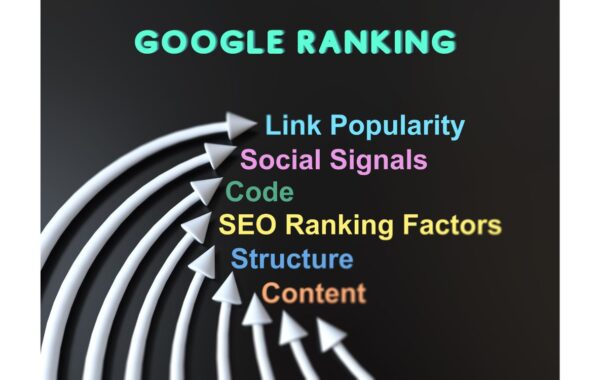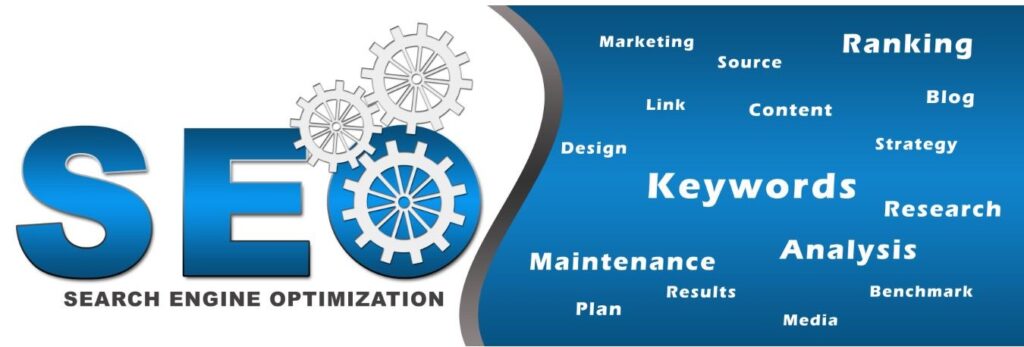How do Rank new WordPress website on my first attempt?
85% of new users never scroll past the first page of search engine results. This astonishing statistic is important for ranking higher in search engine results pages (SERPs) for your new WordPress website. In today’s digital landscape, achieving a high ranking in SERPs is crucial for driving organic traffic, increasing visibility, and attracting potential customers.
So, how can you ensure that your new WordPress website stands out and secures a top position in SERPs? The answer lies in implementing effective SEO strategies and optimizing your website’s content and structure. From understanding Google rankings to keyword research, on-page optimization to link building, and technical SEO to monitoring performance, every aspect plays a critical role in boosting your website’s visibility and driving success in SERPs.
In this article, we will delve into these essential strategies and provide you with valuable insights to help you rank higher in SERPs for your new WordPress website. So, let’s get started and unlock the secrets to achieving SEO success in 2024!
Key Takeaways:
- Ranking higher in SERPs is crucial for driving organic traffic and increasing visibility.
- Implementing effective SEO strategies is essential to optimize your new WordPress website.
- Understanding Google rankings and search intent can enhance your website’s visibility in SERPs.
- Optimizing Your WordPress Site Structure for Better Google Ranking: Organize your content logically, use descriptive URLs, and create a clear navigation menu. Use categories, tags, and internal linking effectively.
- On-page SEO optimization, keyword research, and high-quality content creation are key factors for ranking higher.
- Leveraging Keywords to Boost Your WordPress Site’s Google Ranking: Integrate these keywords naturally into your content, meta titles, descriptions, and headings. Avoid keyword stuffing.
- Building high-quality backlinks and optimizing technical SEO factors are crucial for SEO success.
- The Role of High-Quality Content in Google Ranking: Create valuable, informative, and engaging content. Aim for longer articles that provide in-depth information.
- Improving Site Speed: A Crucial Factor for Higher Google Ranking: Optimize images, use caching, and minimize HTTP requests to enhance site speed. Google considers site speed as a ranking factor, so ensure your WordPress site loads quickly.
- Improving your website’s loading time is crucial for providing a better user experience and boosting search engine rankings.
- The Impact of Mobile Responsiveness on Your Google Ranking: Ensure your WordPress site is mobile-friendly. Google prioritizes mobile-first indexing.
- Monitoring Your WordPress Site’s Performance and Adjusting SEO Strategies: Regularly analyze your site’s performance using tools like Google Analytics and Google Search Console
Understanding Google Rankings and Search Intent
Google rankings play a crucial role in determining the visibility of your website in search engine results pages (SERPs). In order to improve your website’s ranking and attract more organic traffic, it is important to understand the factors that influence Google’s ranking metrics.

One such factor is search intent – the underlying reason behind a user’s search query. Google aims to provide the most relevant and useful results to users based on their search intent. By aligning your content to match what users are looking for, you can increase your website’s visibility in SERPs and improve its ranking.
Search intent refers to the intention of the user when conducting a search query. It can be categorized into four main types:
- Informational intent: Users are looking for information about a specific topic or question. They seek answers, explanations, or advice.
- Navigational intent: Users are trying to navigate to a particular website or web page. They are searching for a specific brand, company, or website.
- Transactional intent: Users are ready to make a purchase or engage in a specific action. They are looking for products, services, or specific actions such as booking flights or making hotel reservations.
- Commercial investigation intent: Users are looking to gather information before making a purchasing decision. They are comparing products, reading reviews, and seeking recommendations.
By understanding these search intents, you can create content that aligns with what users are seeking, thus increasing the relevance of your website in Google’s eyes.
Understanding search intent is crucial for optimizing your content and improving your website’s Google rankings. By addressing the specific needs and queries of your target audience, you can create valuable and relevant content that aligns with search intent and attracts organic traffic.
Furthermore, there are various other factors that influence Google rankings, including:
- Relevance: How well your content matches the user’s search query.
- Quality: The overall quality, credibility, and usefulness of your content.
- User experience: How user-friendly and accessible your website is.
- Backlinks: The number and quality of external websites linking to your website.
- Page load speed: How fast your website loads and delivers content to users.
By addressing these factors and optimizing your website accordingly, you can increase your chances of ranking higher in Google’s SERPs.
With a solid understanding of Google rankings and user search intent, you can develop an effective SEO strategy that improves your website’s visibility, attracts organic traffic, and boosts your overall online presence.
On-Page SEO Optimization for a New WordPress Website
When it comes to improving your website’s rankings and increasing its visibility, on-page SEO optimization is a critical factor to consider. By implementing effective on-page SEO tactics, you can enhance your website’s chances of ranking higher in search engine results and attracting organic traffic. In this section, we will explore the key on-page SEO strategies for a new WordPress website.

Optimizing Title Tags
A well-optimized title tag is essential for improving your website’s visibility in search results. Make sure to include relevant keywords in your title tag, as it helps search engines understand the content of your page and its relevance to user queries. Avoid keyword stuffing and keep your title tags concise and compelling to attract clicks from potential visitors.
Including Relevant Keywords in Content
Creating high-quality, keyword-rich content is crucial for on-page SEO success. Conduct thorough keyword research to identify the most relevant keywords for your target audience. Incorporate these keywords naturally throughout your content, including headings, paragraphs, and image alt tags. Remember, the goal is to provide valuable and informative content while optimizing it for search engines.
Creating a User-Friendly URL Structure
A user-friendly URL structure not only improves the user experience but also contributes to better search engine rankings. Ensure that your URLs are descriptive, concise, and easy to understand. Avoid using excessive numbers, symbols, or special characters in your URLs. Instead, use relevant keywords that accurately represent the content of the page.
Pro Tip: Use hyphens (-) to separate words in your URLs, as they are more search engine-friendly compared to underscores (_) or spaces.
By implementing these on-page SEO optimization techniques, you can enhance your new WordPress website’s visibility, improve its rankings in search engine results, and attract organic traffic. Remember to regularly monitor and analyze the performance of your website to identify areas for further optimization and improvement.
Keyword Research and Content Creation
Performing thorough keyword research is an essential step in optimizing your content and attracting organic traffic to your website. By identifying relevant keywords that align with your target audience’s search intent, you can increase your chances of ranking higher in search engine results pages (SERPs).

When conducting keyword research, consider the topics and themes that are relevant to your website’s niche. Use keyword research tools to identify keywords with a good search volume and moderate to low competition. These tools will provide insights into popular search terms and related keywords that can inform your content creation strategy.
Once you have a list of targeted keywords, it’s important to incorporate them naturally into your content. Avoid keyword stuffing or overusing keywords, as this can negatively impact your website’s rankings. Instead, focus on creating high-quality and engaging content that provides value to your audience.
“Quality content is at the heart of any successful SEO strategy. By creating content that is informative, relevant, and engaging, you can attract more organic traffic and increase your website’s visibility in SERPs.”
Creating High-Quality and Engaging Content
When it comes to content creation, it’s important to understand the search intent of your target audience. What are they looking for when they search for specific keywords? By aligning your content with their search intent, you can provide them with valuable information and address their needs.
Consider the format of your content as well. Depending on your target audience’s preferences and the nature of your topic, you may choose to create blog posts, videos, infographics, or other types of content. The key is to deliver your message in a way that resonates with your audience and keeps them engaged.
Remember to optimize your content for readability by using headings, bullet points, and images to break up the text. This not only improves the user experience but also makes it easier for search engines to understand and index your content.
To further enhance your content’s visibility and shareability, consider implementing a social sharing plugin on your website. This allows readers to easily share your content on their social media platforms, increasing its reach and potentially attracting more organic traffic.
The Power of Relevant and Engaging Content
Creating high-quality and engaging content is a key component of any successful SEO strategy. It not only attracts organic traffic but also encourages visitors to spend more time on your website, reducing bounce rates and increasing the likelihood of conversions.
When crafting your content, keep these tips in mind:
- Focus on providing unique insights and valuable information.
- Make your content easy to understand and navigate.
- Use relevant keywords naturally throughout your content.
- Include compelling visuals, such as images or videos, to enhance engagement.
- Create shareable content that encourages readers to spread the word.
By consistently creating high-quality and engaging content that aligns with the search intent of your target audience, you can establish your website as a trustworthy and authoritative source in your industry. This will help improve your website’s rankings and drive organic traffic over time.
Building High-Quality Backlinks for a New WordPress Website
Backlinks play a crucial role in improving the authority and visibility of a website. Search engines like Google consider high-quality backlinks as a trust signal, indicating that other reputable websites endorse your content or services. As a result, building high-quality backlinks is essential for boosting the ranking potential of your new WordPress website.

When it comes to backlinks, quality matters more than quantity. It’s important to focus on acquiring links from reputable sources that are relevant to your industry or niche. By doing so, search engines perceive your website as a valuable resource, leading to improved rankings in search engine results pages (SERPs).
Effective Link-building Strategies for New WordPress Websites
Implementing effective link-building strategies is crucial for attracting high-quality backlinks. Here are a few strategies you can consider:
- Outreach: Reach out to other website owners, bloggers, and influencers in your industry. Establish connections and pitch them your valuable content or resource that they might want to link to.
- Guest Posting: Contribute guest articles or blog posts to authoritative websites or blogs in your industry. This allows you to showcase your expertise, generate brand awareness, and earn backlinks in return.
- Content Promotion: Create high-quality, shareable content that naturally attracts backlinks. Promote your content through social media, email marketing, and other channels to increase its visibility and encourage link acquisition.
- Resource Link Building: Create comprehensive and informative resources, such as guides, tutorials, or industry reports. These types of resources often attract backlinks from other websites looking to provide valuable information to their audience.
Remember, the key to successful link building is to focus on relevance, authority, and value. By acquiring high-quality backlinks from reputable sources, you can enhance your website’s visibility, increase organic traffic, and improve your overall SEO performance.
Note: Building high-quality backlinks requires time, effort, and a strategic approach. Be patient and consistent in your link building efforts, and remember to always prioritize quality over quantity.
Technical SEO Optimization for a New WordPress Website
When it comes to improving your website’s rankings, technical SEO is a crucial factor to consider. By optimizing various technical aspects of your WordPress website, you can enhance user experience, increase visibility in search engine results pages (SERPs), and ultimately drive more organic traffic to your site.
Mobile-Friendliness
One of the primary technical SEO considerations for your WordPress website is mobile-friendliness. With the majority of internet users accessing websites on their mobile devices, it’s essential to ensure that your site is responsive and provides a seamless experience across different screen sizes. By utilizing mobile-friendly design practices and implementing responsive themes, you can cater to the needs of mobile users and improve your website’s rankings.
Page Speed
Page speed is a critical factor that influences both user experience and search engine rankings. Slow-loading websites not only frustrate users but also tend to have lower rankings in SERPs. To optimize your WordPress website’s page speed, you can consider various measures such as compressing images, minifying CSS and JavaScript files, and leveraging browser caching. By speeding up your website’s loading time, you can provide a better user experience and increase your chances of ranking higher in search results.
Structured Data
Implementing structured data on your WordPress website can help search engines understand and interpret your content more effectively. By using schema markup, you can provide additional context to your website’s elements, such as articles, events, products, and reviews. This structured data not only enhances search engine visibility but also enables rich snippets to appear in search results, offering users more information and enticing them to click on your website.
Optimizing the technical aspects of your WordPress website is essential for improving its rankings and overall SEO performance. By focusing on mobile-friendliness, page speed, and structured data, you can provide a better user experience, increase visibility in SERPs, and attract more organic traffic to your site.
Furthermore, utilizing SEO plugins can greatly simplify the technical optimization process for your WordPress website. These plugins provide user-friendly interfaces and powerful features that allow you to easily manage and optimize various technical SEO elements. Some popular SEO plugins for WordPress include Yoast SEO, All in One SEO Pack, and Rank Math.
Implementing technical SEO best practices and continuously monitoring your website’s performance can help you stay ahead in the ever-evolving digital landscape. By prioritizing technical optimization for your WordPress website, you can improve its visibility, rankings, and ultimately drive more organic traffic and conversions.
Monitoring and Analyzing SEO Performance
Monitoring and analyzing your SEO performance is essential to identify areas for improvement and make data-driven decisions. By understanding how your website is performing in search engine rankings, you can tailor your strategies to maximize your online visibility and reach your target audience effectively.
Two tools that provide valuable insights into your website’s performance are Google Analytics and Google Search Console. These tools allow you to track and analyze key metrics such as website traffic, keyword performance, and user behavior.
Google Analytics provides a comprehensive overview of your website’s performance. It enables you to understand how users find and interact with your website, giving you crucial information on which marketing efforts are driving traffic and conversions.
Google Search Console offers detailed reports on your website’s visibility in search results. It allows you to monitor your website’s indexing status, track keyword rankings, and identify any issues that may be affecting your website’s performance in search engine results pages (SERPs).
Regularly tracking key performance indicators (KPIs) is essential for refining your SEO strategies. By analyzing metrics such as organic traffic, bounce rate, conversion rates, and average session duration, you can gain valuable insights into the effectiveness of your optimization efforts.
“Monitoring and analyzing SEO performance is like having a compass for your online marketing activities. It helps you navigate through the ever-changing landscape of search engine algorithms and make informed decisions to improve your website’s visibility.”
With monitoring and analysis, you can identify trends, spot opportunities, and address any issues that may arise. By staying proactive and responsive, you can continuously optimize your SEO strategies to improve rankings and drive more organic traffic to your website.
Benefits of Monitoring and Analyzing SEO Performance
- Identify areas for improvement: By tracking key metrics, you can identify gaps in your SEO strategy and make the necessary adjustments to improve your website’s performance.
- Measure the success of optimization efforts: Monitoring SEO performance allows you to measure the impact of your optimization efforts and determine the effectiveness of your strategies.
- Discover new opportunities: Analyzing SEO data can reveal untapped keywords, content ideas, or marketing channels that you can leverage to further enhance your online visibility.
- Stay ahead of the competition: Monitoring your SEO performance enables you to stay informed about your competitors’ strategies and adjust your approach accordingly to maintain a competitive edge.
Remember, monitoring and analyzing your SEO performance is an ongoing process. By regularly reviewing and refining your strategies based on data-driven insights, you can optimize your website’s performance and achieve long-term success in the ever-evolving digital landscape.
Enhancing User Experience and Website Security
Providing a positive user experience is vital for improving your website’s rankings. Optimizing your website’s navigation, improving site speed and responsiveness, and ensuring website security are all essential aspects of enhancing user experience. Implementing a reliable SSL certificate and using HTTPS can also enhance your website’s security and trustworthiness in the eyes of both users and search engines.
When it comes to user experience, a well-designed website with intuitive navigation and easy-to-find information can greatly improve engagement and visitor satisfaction. Users should be able to navigate through your site effortlessly, finding the information they need without frustration.
Additionally, optimizing your website for speed and responsiveness is crucial in today’s fast-paced digital landscape. Slow-loading websites not only negatively impact user experience but also have a direct correlation to lower search engine rankings. Ensure that your website is optimized for quick loading times and provides a seamless browsing experience across different devices and screen sizes.
In terms of website security, implementing measures to protect user data and prevent cyber threats is of utmost importance. One crucial step is to obtain a reliable SSL certificate, which encrypts the data exchanged between users and your website, ensuring secure transmission of sensitive information. This not only safeguards user privacy but also builds trust and credibility.
“Implementing a reliable SSL certificate and using HTTPS can also enhance your website’s security and trustworthiness in the eyes of both users and search engines.”
Using HTTPS also adds an extra layer of security by verifying the authenticity and integrity of your website. Search engines, like Google, prioritize websites with HTTPS in their rankings to ensure a safer browsing experience for users.
In summary, enhancing user experience and website security are crucial components of improving your website’s rankings. By optimizing your website’s navigation, speed, and responsiveness, you can provide a positive browsing experience that keeps users engaged. Additionally, implementing website security measures like SSL certificates and HTTPS can help protect user data and build trust with both users and search engines.
Reliable website Speed Test Tools
- PageSpeed Insights: Developed by Google, this tool analyzes your web pages and provides insights on how to make them faster across all devices. It’s a great starting point for optimizing your site.
- GTmetrix: GTmetrix uses Google Lighthouse to measure website performance. It offers detailed reports, including recommendations for improvement.
- Pingdom: Pingdom is a monitoring platform that provides a free website speed test. It measures your site’s speed and offers additional services like improvement suggestions and visitor insights.
- WebPageTest: WebPageTest allows you to test your site from multiple locations, browsers, and devices (desktop, mobile, and tablet). It’s a comprehensive tool for in-depth analysis.
- KeyCDN Website Speed Test: This tool checks your website’s load time and provides performance metrics. It’s simple to use and offers valuable insights.
- Dotcom-Monitor: Dotcom-Monitor offers a website speed test with various testing locations. It helps diagnose hidden issues impacting your internet connectivity.
Conclusion
Improving the ranking of your new WordPress website requires a comprehensive approach that encompasses various SEO strategies. By implementing on-page optimization techniques, conducting thorough keyword research, creating high-quality content, building authoritative backlinks, optimizing the technical aspects of your website, and monitoring your SEO performance, you can increase your visibility in search engine results pages (SERPs) and attract organic traffic.
On-page SEO optimization is a crucial factor in improving your website’s rankings. By optimizing your title tags, incorporating relevant keywords in your content, and creating a user-friendly URL structure, you can enhance your website’s visibility and increase its chances of ranking higher in SERPs.
Additionally, conducting comprehensive keyword research and creating engaging content that aligns with the search intent of your target audience is essential. By incorporating relevant keywords naturally into your content, you can increase your website’s chances of ranking higher in SERPs and attracting organic traffic.
Furthermore, building high-quality backlinks from reputable sources is an effective strategy for improving your website’s authority and visibility. By implementing link building techniques such as outreach and guest posting, you can attract more organic traffic and improve your website’s overall SEO performance.
In order to enhance user experience, it is important to optimize your website’s navigation, improve site speed and responsiveness, and ensure website security. By implementing these measures and providing a positive user experience, your website will be more appealing to users and search engines alike.
Continuously monitoring and analyzing your SEO performance is crucial for identifying areas for improvement and making data-driven decisions. Tools like Google Analytics and Google Search Console provide valuable insights into website traffic, keywords, and user behavior, allowing you to refine your SEO strategies and measure the success of your optimization efforts over time.
In conclusion, by embracing a holistic approach that incorporates on-page optimization, keyword research, content creation, link building, technical SEO, and regular performance monitoring, you can significantly improve the ranking of your new WordPress website. By continuously improving your SEO efforts and staying up to date with the latest trends and best practices, you can increase visibility in SERPs, attract organic traffic, and elevate your website’s rankings.
FAQ
How can I rank higher for my new WordPress website in SERPs?
To rank higher in search engine results pages (SERPs) for your new WordPress website, you need to implement effective SEO strategies. This involves optimizing your website’s content and structure, performing keyword research, building high-quality backlinks, and ensuring technical SEO factors are in place.
How do Google rankings and search intent impact my website’s ranking?
Google rankings are determined by various factors, including relevance and usefulness to users. Understanding search intent, or what users are looking for when conducting a search, helps you align your content to match their needs. By addressing these factors, you can increase your website’s visibility and ranking potential in SERPs.
What is on-page SEO and how can it improve my WordPress website’s rankings?
On-page SEO involves optimizing various elements of your website, such as title tags, content, and URL structure. By optimizing these aspects and including relevant keywords, you can improve your website’s visibility in SERPs and increase your chances of ranking higher.
How important is keyword research and content creation for my new WordPress website’s rankings?
Keyword research is essential for identifying relevant keywords that your target audience is searching for. By incorporating these keywords naturally into your content, you can increase your chances of ranking higher in SERPs. Creating high-quality and engaging content that meets the search intent of your audience is also crucial for improving your website’s rankings.
How can building high-quality backlinks improve my new WordPress website’s rankings?
Backlinks are a crucial ranking factor used by search engines to determine the authority and credibility of a website. By building high-quality backlinks from reputable sources, you can improve your website’s visibility and ranking potential in SERPs. Strategies like outreach and guest posting can help attract more organic traffic and improve your website’s SEO performance.
What are some technical SEO factors that can enhance my new WordPress website’s rankings?
Technical SEO factors, such as mobile-friendliness, page speed, and structured data, play a significant role in improving your website’s rankings. Optimizing your website for mobile devices, improving page loading speed, and implementing schema markup can enhance user experience and increase your website’s visibility in SERPs. Using SEO plugins can simplify the technical optimization process for your WordPress website.
How can I monitor and analyze the SEO performance of my new WordPress website?
You can monitor and analyze your website’s SEO performance using tools like Google Analytics and Google Search Console. These tools provide valuable insights into website traffic, keywords, and user behavior. By regularly tracking key performance indicators, you can refine your SEO strategies and make data-driven decisions to improve your website’s rankings.
What are some ways to enhance user experience and website security for my new WordPress website?
Providing a positive user experience is vital for improving your website’s rankings. Optimizing your website’s navigation, improving site speed and responsiveness, and ensuring website security are essential aspects of enhancing user experience. Implementing a reliable SSL certificate and using HTTPS can also enhance your website’s security and trustworthiness in the eyes of both users and search engines.
How can I improve the ranking of my new WordPress website overall?
Improving the ranking of your new WordPress website requires a comprehensive approach that incorporates on-page SEO optimization, keyword research, content creation, link building, technical SEO, and monitoring performance. By focusing on these strategies and continuously improving your website’s SEO efforts, you can increase visibility in SERPs, attract organic traffic, and elevate your website’s rankings.
